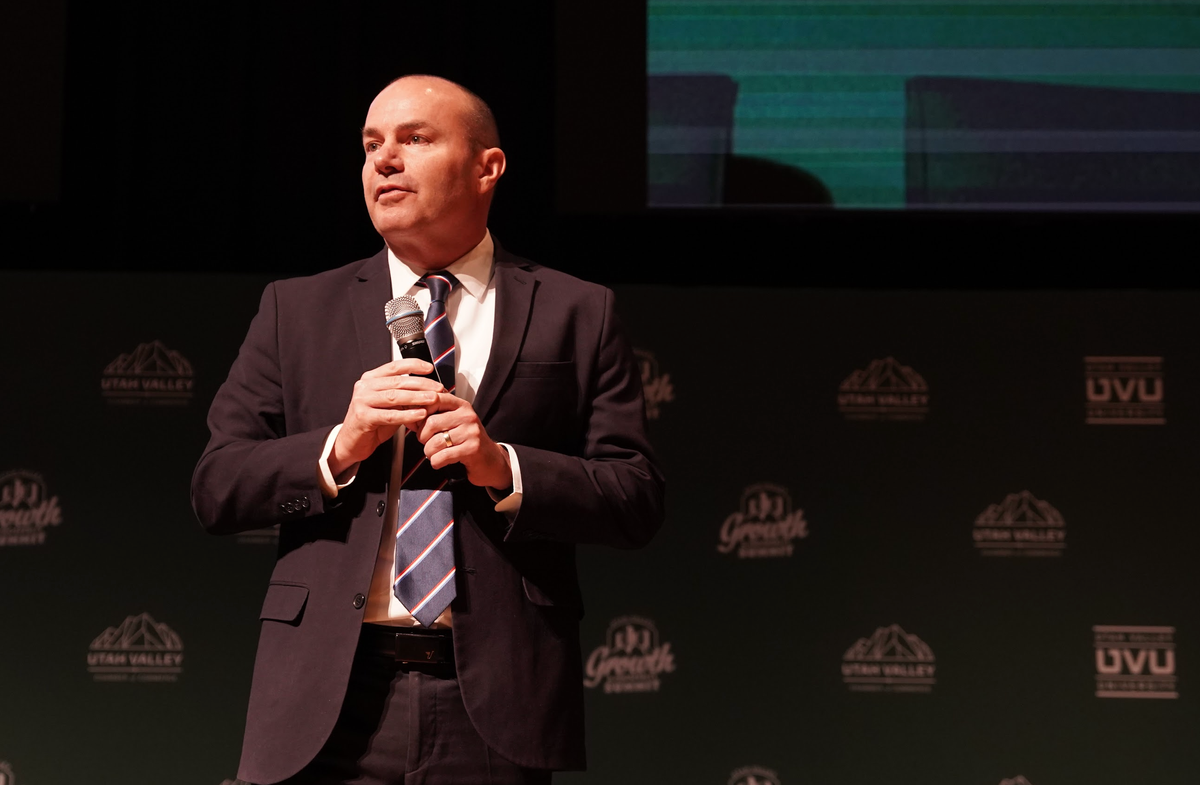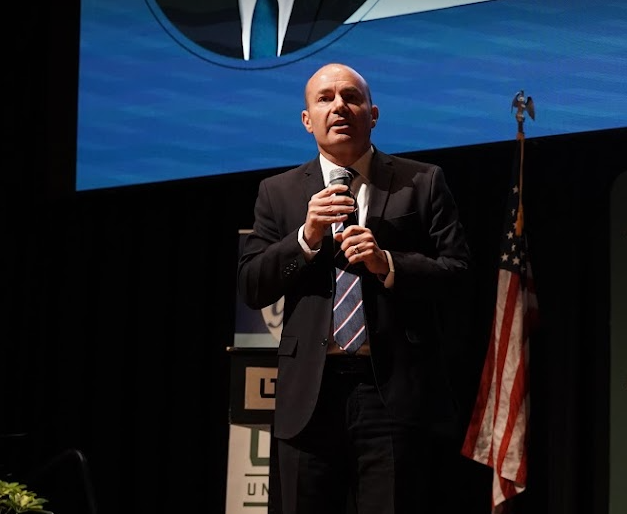

Orem, Utah, November 8, 2024
Utah Valley University hosted the Third Annual Utah Valley Growth and Prosperity Summit sponsored by Utah Valley Chamber of Commerce in partnership with UVU. Other sponsors included Desert Digital Media, Governor’s Office of Economic Opportunity, KSL.com, RBM Building Services, Gary R. Herbert Institute for Public Policy, and The Clyde Companies.
A large and diverse audience of business owners, university faculty, and students listened to multiple panels and breakouts covering myriad topics around Utah’s economic growth, population trends, and housing challenges, among other topics.
As one of the Summit's keynote speakers, Senator Mike Lee presented a new legislative proposal aimed at tackling affordable housing shortages.
Senator Lee praised Utah’s appeal and attractiveness as a state to new residents wanting to move here. Described Utah as a model for innovation and economic growth, “Utah is the kind of state that other states look at enviously, because we have so much going for us,” stated Senator Lee.

And yet, the combination of Utah’s historically high birth rates and especially the rising influx of people relocating to the state are the contributors to the current housing crunch the state is facing, according to Senator Lee.
To alleviate this housing shortage, Senator Lee presented the "HOUSES Act," a bill he has introduced that would enable local governments to purchase and develop certain federally owned lands for housing, adding a projected 770,000 houses to the state's current inventory of 1.13 million residential houses.

The bill targets land managed by the Bureau of Land Management (BLM), specifically in areas with existing infrastructure, like water and power lines. According to Senator Lee, the HOUSES Act would permit local governments “to purchase it for the limited purpose of developing single-family, entry-level homes,” with restrictions to prevent its use for vacation or luxury housing. Senator Lee emphasized that this measure would not impact Utah’s national parks or other iconic federal lands, focusing instead on underutilized BLM parcels near municipalities. He pointed out that this bill has high relevance for many nearby western states that have large percentages of land that are federally owned. He said it is a topic not easily appreciated by many of his peers in the US Senate from eastern states that have tiny fractions of federally-owned land.
"With nearly 70% of Utah's land federally owned, and some counties facing federal ownership rates exceeding 90%, our local governments are restricted in their ability to grow,” explained Senator Lee. He pointed out that limited property tax revenues from federally owned lands leave local governments financially strained, affecting funding for essential services like schools, law enforcement, and search and rescue operations.

According to Senator Lee, the HOUSES Act would:
Create a process to nominate a parcel of BLM land to address housing shortages, excluding lands with special designations like national monuments, wilderness areas, or national recreation areas.
Upon DOI approval, the state or unit of local government could purchase a housing tract at a PILT ratioed price. Payments in Lieu of Taxes (PILT) are Federal payments that help local governments offset losses in property taxes due to the existence of nontaxable Federal lands within their boundaries.
By increasing access to affordable land, states and local governments could address housing shortages and housing affordability with low-income housing, condominiums, apartments, single family homes, etc.
The HOUSES Act would require that a unit of local government enact zoning laws to ensure development of the land proceeds as planned – for housing purposes. At least 85% of the land acquired be used for residential purposes and related community needs, at a density of not less than four homes per acre. Residents would need to live in these homes for a minimum number of years; they are not meant to be second homes or vacation homes.
It would also provide for related community needs such as primary and secondary schools, places of worship, grocery stores, and hospitals and health clinics.

Beyond land access, Lee addressed broader federal issues, emphasizing the need to reassert Congress’s role in the legislative process. Citing a 1937 Supreme Court case that expanded federal regulatory powers, he argued that Congress has, over the decades, delegated too much authority to federal agencies, which has distanced the government from the people it serves. “We’ve got to make sure that the federal government works for the people,” he said, underscoring that “federal bureaucrats don’t work for you. You don’t elect them, you can’t fire them, and yet they control so much of our lives.” Lee stressed the need to restore a balance between state and federal powers to support Utah's growth and preserve its values.
Senator Lee’s remarks underscored the unique economic mobility Utah offers. He described it as a place where “if you work hard and play by the rules, one day you’ll retire comfortably, if not wealthy.” His proposals aim to ensure that Utah remains a land of opportunity for both current residents and newcomers, preserving what he called “Utah’s secret sauce” – a blend of economic growth, local control, and community resilience.
To read more about the HOUSES Act and to see the full text of the bill, click here.

